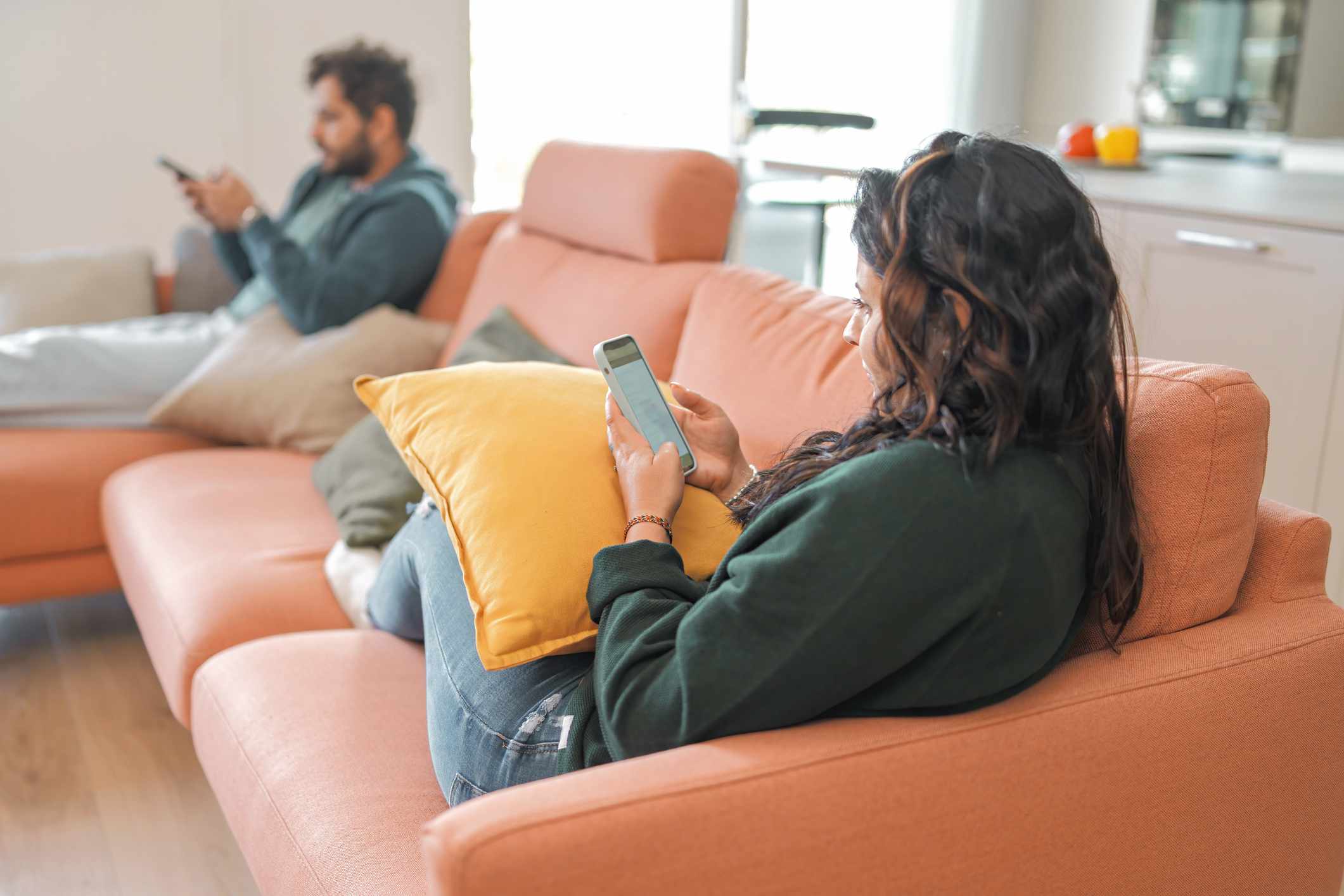'Phubbing' Might Be Ruining Your Relationships—Here's How to Kick the Habit New research shows perceived phubbing in relationships is linked to a greater risk of loneliness or psychological distress

Phubbing—short for phone snubbing—occurs when one person is being ignored because the other person is on their phone
- People who are exposed to perceived phubbing are more likely to experience loneliness or psychological distress.
- Phubbing—short for phone snubbing—occurs when one person is being ignored because the other person is on their phone.
- If you're on the receiving end of phubbing, it can be helpful to call out the other person's behavior; if you're the one doing the phubbing, it can be helpful to learn to disconnect from your phone more often.
Have you ever ignored your partner to scroll through Instagram or TikTok? You might be putting them at an increased risk of loneliness and psychological distress, new research shows.
The term for this is “phubbing”—short for phone snubbing—and it’s a relatively new but worrisome phenomenon.
“[It’s] used to describe situations in which someone physically present is being ignored because the other person is on their phone,” Naomi Torres-Mackie, PhD, a clinical psychologist at Lenox Hill Hospital who was not involved in the new research, told Health.
“The term was first coined in 2012 as part of a marketing campaign,” said Torres-Mackie. “[It] has more recently become part of mainstream culture as the use of mobile phones proliferates simultaneously with a loneliness epidemic.”
Now, a new study published in BMC Psychology shows that people who are exposed to perceived phubbing are more likely to experience loneliness or psychological distress, which can also make them feel less satisfied with their lives.
Here’s what to know about phubbing’s impact on feelings of loneliness, and what to do if you’ve experienced phubbing, or how to break a phubbing habit of your own.

Giuseppe Lombardo/Getty Images
The Impact of Phubbing on Relationships
For the new study, published in October, researchers asked 720 Romanian adults aged 18 to 77 to self-report how much phubbing they felt they experienced, along with their feelings of life satisfaction.
Greater perceived exposure to phubbing was linked to higher levels of psychological distress and loneliness. There was no direct association between phubbing and life satisfaction, but participants who experienced more loneliness had an increased chance of both psychological distress and decreased life satisfaction.
“Findings indicate that phubbing can lead to feelings of social exclusion, reduced communication quality, and decreased relationship satisfaction,” Ryan Sultán, MD, assistant professor of clinical psychiatry and director of the Sultan Lab for Mental Health Informatics at Columbia University Vagelos College of Physicians and Surgeons, who was not involved in the new research, told Health.
According to researchers, the findings identify a need to address the use (and misuse) of digital devices like smartphones in the context of relationships, as well as the need to better understand how habits like phubbing can affect people, and how to effectively change those behaviors.
The effects of phubbing can impact all interpersonal relationships—romantic relationships, friendships, and even the relationships we have with our colleagues.
“In romantic relationships, [phubbing] can result in conflict and decreased satisfaction,” said Sultán. “In other interpersonal interactions, like with friends or colleagues, it can lead to decreased trust and a sense of being undervalued.”
But why does phubbing have such an impact on those who experience it? It has to do with how our devices make us feel.
“The addictive nature of digital devices stems from the dopamine hits they provide,” said Sultán. “Dopamine, a neurotransmitter associated with pleasure and reward, is released in response to the rewards from social media interactions and notifications. This can lead to habitual device use, making disengagement challenging.”
Additionally, feelings associated with phubbing may be exacerbated in the aftermath of the COVID-19 pandemic. “Now that we are able to be back together in person, we are easily disappointed by disjointed social situations in which attention is stolen away by cellphones,” said Torres-Mackie.
How to Deal With Phubbing in Relationships
How to handle phubbing depends on whether you’re the person experiencing it or the person doing the phubbing.
If you notice you’re on the receiving end of phubbing, it can be helpful to call out the behavior and then model and show an alternative behavior, according to Lokesh Shahani, MD, PhD, MPH, assistant professor in the Department of Psychiatry and Behavioral Sciences at UTHealth Houston's McGovern Medical School.
“For example, asking them to stop using their cellphone and engaging with them in a ‘phone-free’ meaningful conversation” can be helpful, said Shahani.
Expressing your feelings in an honest, vulnerable way can effectively convey the impact of their behavior. “Your time is valuable and it is unfair for someone to ignore you for social media feeds or other non-urgent digital activities,” said Sultán.
On the flip side, if you’re guilty of phubbing, there are ways to modify your behavior—and it starts with setting aside time to put your phone away.
“Creating a ‘no phone zone’ or ‘no phone time’ is key in breaking these habits,” said Shahani. “We encourage people to put their phones away when having dinner with friends and family, or putting your phone away when driving in a car with family. This encourages people to communicate in a more personal manner and promotes healthy relationships.”
Another helpful tip is to mute notifications and change the settings on your phone so you won’t be disturbed.
“I recommend turning off notifications during interpersonal interactions and setting your phone to grayscale to reduce its appeal,” said Sultán. “This encourages presence in the moment and respects the people around you. Remember, the key to healthy interpersonal relationships is mutual respect and attention.”
This story originally appeared on: Health News - Author:Kaitlin Vogel


















